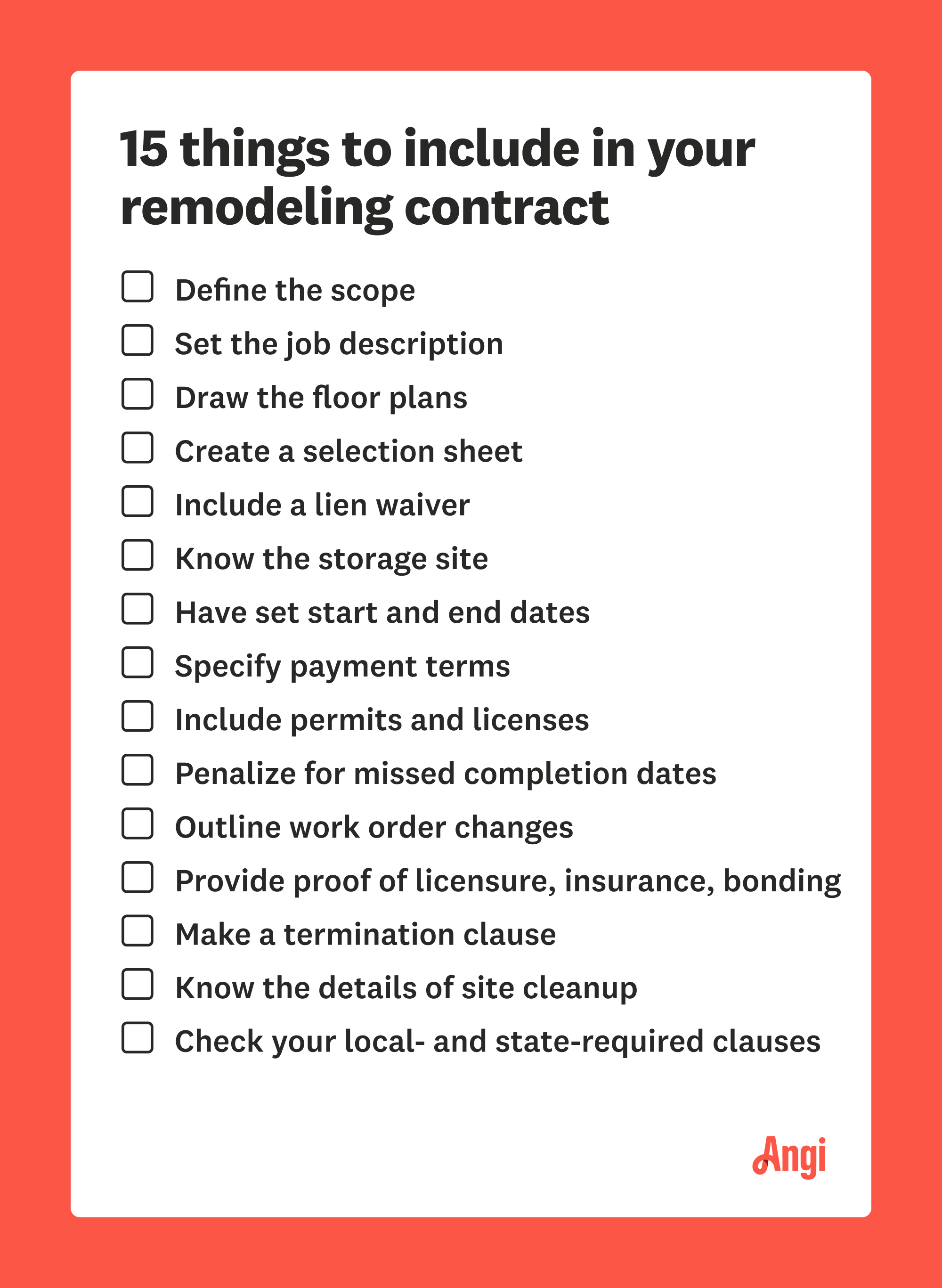
The cost to build a brick house is high, but the aesthetic and durability can be well worth the investment if you’re looking for something unique.
Put your red pen to use before you sign a remodeling contract


Define your project’s scope, budget, deadline, and payment.
Different states have different requirements for remodeling.
Include terms that protect you from late payments and liens.
Know which legal clauses are required by your state.
Take action if you suspect unethical actions.
When signing a remodeling contract, it’s easy to overlook the fine print. But the last thing you want to do is sign a contract before you and the home improvement contractor agree on every term and condition. Though contracts may seem set in stone and intimidating, you’ll want to take out your magnifying glass and be on the lookout for important sections to include or omit to avoid projects that drag on or end up being more complicated than you planned. With this in mind, here’s what you need to know before you sign a home renovation contract.
A home renovation contract is a legal agreement between the contractor and homeowner that lays out the terms of your project (and finally lets you do something with all those home addition ideas you have). If it’s done correctly, your contract should be a thorough document explaining every aspect of your renovation project that you’ll feel confident signing.
When you choose to hire a local remodeling contractor, search for a pro who has specific contract terms included in the contract that protect you in the case of an unforeseeable event. You also want to keep an eye out for terms that could make you liable for covering the cost of a service or material.
“Many homeowners want the lowest price, but also want the contractor to adhere to all the regulatory constraints,” says Bob Tschudi, Expert Review Board Member and general contractor in Raleigh, NC. “These goals are mutually exclusive, as following all the regulatory rules can be expensive. The total cost of a project will include all the safeguards that are required by law.”
A good remodeling contract should contain these 15 items we discuss below.

Once you hire the best home remodeling contractor for the job, it’s important to go over the contract in detail. Key points of a renovation contract include the scope of the work, the job description, a project timeline, and payment terms. It should also cover floor plans, a lien waiver, material storage, and more. Here’s what to know about each point.
The scope of your project covers every detail of the services the professional provides for you. Without a scope of work, you may as well sign the contract blindfolded. Ensure the contract outlines all areas of your project so there are no surprises. This may include:
Demolition and construction specifications
Materials and tools needed to complete the project
Necessary permits
Disposal method for debris and construction material
Proof of your pro’s insurance
The job description should spell out who’s responsible for what. For example, it might state the homeowner (you) agrees to provide payment, home access, and the names of those authorized to sign and amend the contract, while the contractor provides the necessary tools, materials, expertise, and more.
A copy of your floor plan needs to be in your home addition contract to help guarantee your contractor will stick to the plan. While a 2D floor plan is a good option, a 3D rendering increases the chances of accuracy because you can better picture how your floor plan will look beyond the paper. Don’t want to find out after the project started that the sunroom you wanted isn’t the one your pro is building.
When subcontractors start working on your home’s remodeling project, they can claim a legal right against your personal property to satisfy a debt—even if you’ve signed a contract with the contractor agreeing to pay. This mechanics lien gives anyone working on your home a security interest on your property until you pay off the claim. It can also prevent you from selling your home and add levels of complexity and red tape over the payment process because liens involve multiple parties.
Ensure your contractor includes a lien waiver to protect you from a lien. This waiver serves as a receipt that your contractor must sign to show that your payments were used for the cost of labor and materials.
A selection sheet defines the specific materials, colors, types, brands, and amounts of a particular product your contractor will purchase for this project. Most selection sheets are very in-depth to provide you and your contractor with precise information. Contractors should provide a selection sheet in their estimates, but attach the details to your contract for safekeeping and include the warranty information if appropriate.
A selection sheet can be especially helpful for you, as it puts the responsibility of making the correct selections on your contractor in the off chance they make a mistake in the order. After all, the last thing you want in a bump-out project is for the contractor to use the wrong flooring without any records of what you selected.

When planning a home addition project, it’s essential to include in your contract where the materials for your project will be stored in advance. Your contractor will likely start purchasing materials well ahead of the demolition and construction dates. Since materials can cost more than two-thirds of your remodeling project, how they’re stored is extremely important. Some homeowners store the materials on-site, while others opt for off-site storage spaces.
For materials stored off-site, you’ll want the contract to include:
Proof of purchase
Photographed and written log of the stored materials
Storage insurance
Use of a qualified storage facility
You’ll need to talk with your contractor about your project’s time frame and when they can access your home. Then, when reviewing your renovation contract, double-check that these details are clearly outlined as discussed. Be prepared to amend the completion date if there’s a good cause, but don’t accept unreasonable delays.
Home additions cost $50,000 on average, so it’s important to make sure the payment terms are clearly outlined in your contract. Your pro might make the payment terms dependent on project completion. Most contractors will ask for at least 30% down and the remaining balance paid at 50% and 100% job completion.
Each state may have different terms, however. For example, according to the California Contractors State License Board, California law has a down payment limit of 10% of your estimated total cost or $1,000. Determine your state’s requirements for an accurate contract term. It’s a good idea to hold back at least 10% until the job is to your satisfaction.
Your contract should also specify who will obtain the necessary permits and licenses to complete this job. Typically, it’s the contractor's responsibility to fulfill these legal obligations. Some states have laws where a contractor must be licensed by the state if the project is $500 or more to ensure the project is being completed by a qualified pro. Part ways with a contractor who can’t or won’t approach local licensing or permitting agencies.
If penalties aren’t included in the home renovation contract your pro created, talk with a lawyer. Give yourself options to deduct or delay payment if completion dates are missed to encourage the contractor to meet the agreed upon time frame. Be specific about the amounts and clearly define the terms.

Make sure a process for project changes or additions is included. For example, require written sign-off on changes to your project scope—both on your end and the contractor’s end—so you don’t have to accept unauthorized changes. Change orders can happen, but a well-defined project should not have several changes. Large-scale projects often uncover hidden problems that must be addressed before work can continue.
Also, be wary if your contractor routinely seeks changes, and be prepared to amend the payment schedule and contract terms if you are the one who wants to deviate from the original plans.
Find out what, if any, trade licenses your community requires, and don’t hire anyone who fails to meet them. If something goes wrong, you may be forfeiting state or local enforcement assistance if you hire someone who isn’t licensed. Ask for proof of insurance and bonding to protect you from liability for property or job-related injuries.
You want to ensure you are covered if a contractor does poor work or uses shoddy materials. A warranty spells out what they will do to make things right if something goes wrong and how long you are covered if something fails later. Most contractors exclude materials covered by manufacturer warranties or aspects damaged due to homeowner mistakes, but a warranty should help protect you against poor workmanship.
Your home addition contract should include reasons the homeowner or contractor can leave the job without penalty through the use of a termination clause. For example, if the homeowner doesn’t pay the contractor or the job drags on without reasonable explanation for the delay, poor quality work, or failure to adequately communicate, both you and the contractor have a right to terminate the contract.
Just because the construction side of your project is complete doesn’t mean the job is over. Your contract should clearly outline when the job site cleanup will occur after the construction. It’s also a good idea to clarify what the job cleanup will entail. Will your pro clean up the site? What will they do with the waste? Is the cost of a waste removal service included in the project cost?
Many clauses are legally required, but which ones you need to include vary depending on your state and local municipality. Overall, here are some clauses your home remodeling contract should include to ensure it’s not missing a legal requirement:
Recovery fund disclosure: A recovery fund ensures that the state will compensate you in the event of a contractor violation.
Deposit escrow clause: Typically, an independent third party holds onto a set value of money until your contractor meets the set requirements within the contract.
Right to repair: This clause gives you the right to choose who repairs issues with the remodeling without being required to use the original contractor. Search for this clause in the warranty section to avoid needing to use the contractor for repairs down the line.
Financing contingency clause: If you can’t secure your mortgage, this clause allows you to cancel the contract without a penalty.
Owner misinformation liability: Civil action can occur if you present false and/or misleading information to a company.
Issues can happen even with the best remodeling contract. Should you run into problems with your contractor during the home improvement project, follow these tips to resolve the issue:
Review your contract to determine if it’s been violated. Refer back to that contract to ensure the contractor hasn’t complied with a clause.
Talk with the contractor. Communicate with your contractor about parts of the contract you believe were violated.
Seek resolution. Ask your contractor for specific actions to remedy the situation and amend the contract to reflect changes, if necessary.
Keep proper documentation. Keep records of all written correspondence, as well as receipts, canceled checks, and credit card statements. If a business requests documents, send a copy, never the original. Keep a log of all conversations, including the date and time of the call, what was said, and with whom you spoke.
Report suspected unethical or illegal behavior to the proper authorities. Take pictures of work you consider shoddy or below the quality you expected, then either contact the agency that gave your contractor their license or your county or state consumer protection office to file a complaint.
From average costs to expert advice, get all the answers you need to get your job done.

The cost to build a brick house is high, but the aesthetic and durability can be well worth the investment if you’re looking for something unique.

Find out the average cost to repair a greenhouse, key price factors, and ways to save. Get transparent estimates to plan your greenhouse repair project confidently.

Having a dedicated space to retire after a day in the pool may seem like a pipe dream. Learn about pool house costs to see if you can make that dream a reality.

Decide whether a wood or brick house is better for you based on factors like upfront costs, durability, longevity, resale value, and ease of repair.

If you are wondering what is builder grade when it comes to renovations, we share the differences and pros and cons every homeowner should know.

Adding a second story to a house is a great way to get the space you need without uprooting your family. Find out everything you need to know here.